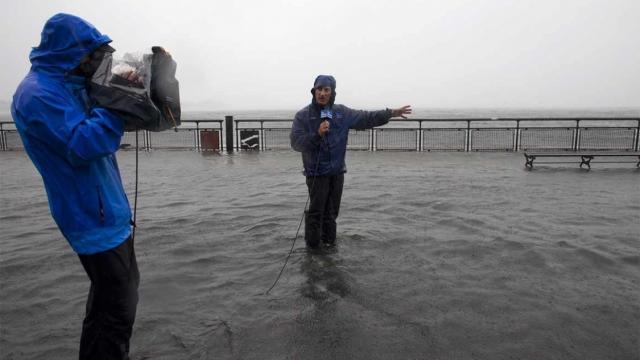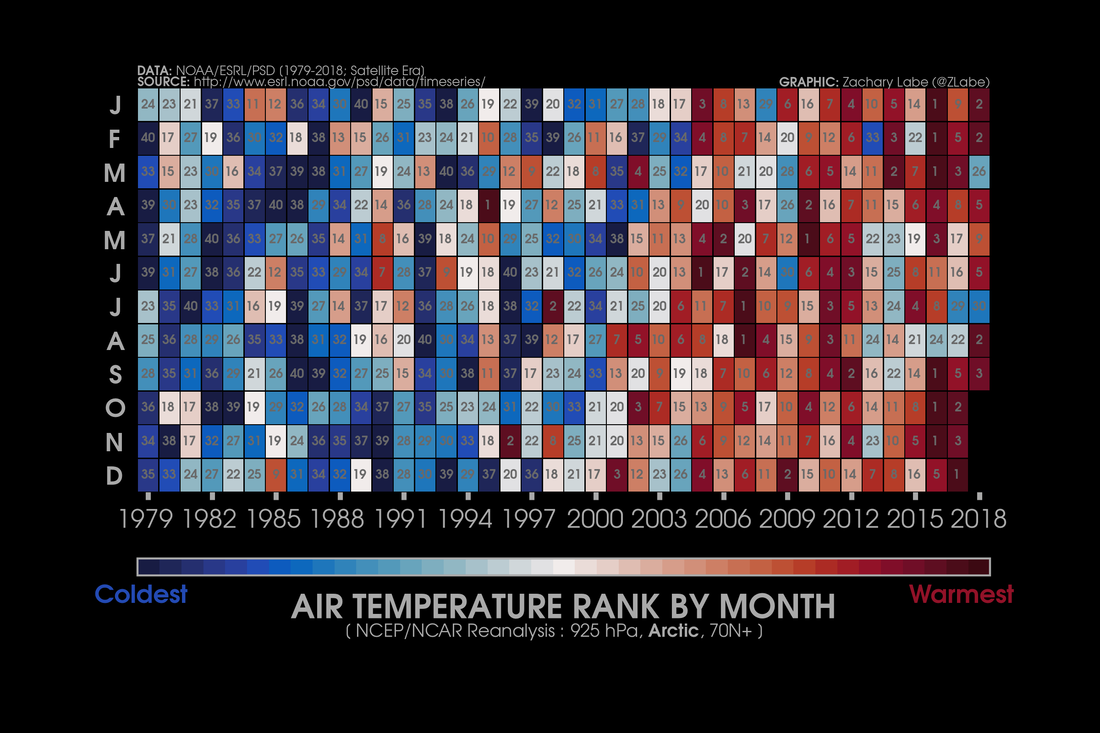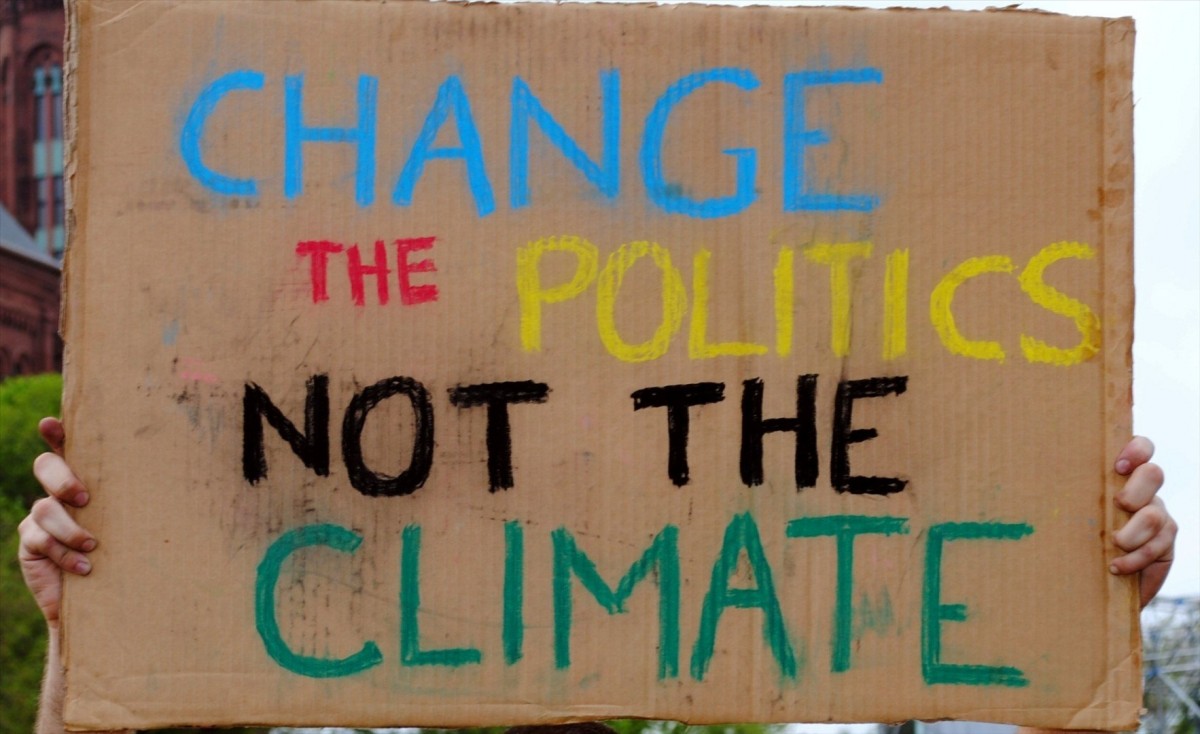
Jonathan Saruk/The Weather Channel via Getty Images
Leading climate scientists and meteorologists are banking on a new strategy for talking about climate change: Take the politics out of it.
That means avoiding the phrase “climate change,” so loaded with partisan connotations as it is. Stop talking about who or what is most responsible. And focus instead on what is happening and how unusual it is—and what it is costing communities.
That was a main takeaway at the American Meteorological Society’s annual meeting this month, where top meteorologists and environmental scientists from around the country gathered to hear the latest research on record rainfall and drought, debate new weather prediction models and digest all manner of analysis on climatic mutations.
Educating the public and policymakers about climate change at a time when elected leaders are doubling down on denying that it is happening at all or that humans are responsible for it demands a new lexicon, conference attendees told me—one that can effectively narrate the overwhelming scientific evidence but not get sucked into the controversy fueled most prominently by President Donald Trump.
The hope is to persuade the small but powerful minority that stands in the way of new policies to mitigate climate change’s worst long-term effects—as well as the people who vote for them—that something needs to be done or their own livelihoods and health will be at stake.
The new language taking root is meant to instill this sense of urgency about what is happening in ways to which everyday citizens can relate—without directly blaming it on human activity: The spring blossoms keep coming earlier; seasonal allergies are worsening and lasting longer; extreme heat is upending the kids’ summer camp schedule; crops are drying up or washing away at alarming rates.
And wherever possible, climate specialists told me, they are trying to explain the more frequent and deadly weather events in purely historical terms: These storms, these droughts, these dramatic fluctuations in temperature have previously taken place exceedingly rarely—once a century, or even once a millennium. But they keep coming.
“Is it humans or is it not? We really need to get beyond that,” Bernadette Woods Placky, an Emmy award-winning meteorologist who directs the Climate Matters program at Climate Central, told me. Climate Matters is tracking climate trends in 244 cities—including a steadily warming Phoenix. “We are still not getting enough people to talk about it in the ways that matter to human beings in their homes, in their communities, for their family,” she added. “So it is making those connections in ways that really matter to people. It’s a jobs story. It’s an agriculture story. Connect it to the farm bill; boom!”
The strategy is being increasingly employed in more conservative regions of the country, where climate doubt still runs deep—even if there are signs of cracks in the resistance thanks to the pummeling pattern of highly unusual and costly weather events.
“They see it firsthand,” Robert Mark Simpson, a professor of geography at the University of Tennessee at Martin, told me. “There is a sort of acknowledgment that the climate is changing. They just don’t think humans are that impactful. [They think blaming humans is] a conspiracy to overthrow the U.S. economy.”
Simpson attended the conference at the Phoenix Convention Center to outline his three-year effort to educate farmers about climate change in western Tennessee and eastern Kentucky, where at some dinner tables the term remains a political curse word. Tennessee just elected a leading climate change doubter, Marsha Blackburn, to the U.S. Senate.
It’s a tall order. So, he is also trying another tack to reach the political and religious conservatives for which farming has been in the family for generations: warning that the family business might be in jeopardy—sooner than they might think.
“Will they be able to farm here 30 to 40 years from now?”
Another line of argument he has found to appeal to conservatives’ personal connection to nature.
“Many are hunters and fishermen. They are really tied to the environment,” Simpson said. He finds he can reach them by trying to tap into their belief that “we’ve been given stewardship” of the Earth.
But the political headwinds that he and others are up against—especially in red states where political leaders are unwilling to accept the scientific consensus that human activity is playing an outsize role in the changing climate—were on display last weekend.
As winter storms bore down on large swaths of the country, Trump took to Twitter to warn Americans to “be careful and try staying in your house. Large parts of the Country are suffering from tremendous amounts of snow and near record setting cold.”
Then the climate science doubter in chief concluded with: “Amazing how big this system is. Wouldn’t be bad to have a little of that good old fashioned Global Warming right now!”
Meanwhile, despite the Democratic takeover of the House, and a new commitment to pass climate change legislation, some leading Republican doubters are still chairing major Senate committees with jurisdiction over climate policy. That includes Sen. Jim Inhofe of Oklahoma, the new head of the Armed Services Committee, which just received a Pentagon report that paints a dire picture of the effects of climate change on dozens of U.S. military bases in the coming years.
Nowhere is the challenge of convincing the doubters without being labeled a partisan or environmental zealot greater than in the ranks of broadcast meteorologists. Local TV weather experts were among the last holdouts in the scientific community to accept the consensus that humans are responsible for climate change—so much so that in 2014 then-President Barack Obama met with some of them as part of his effort to sell his environmental policy agenda.
“I think a lot of the broadcasters were concerned that there was such a political divide within the population and if they were very vocal of any aspect of climate change some subset of their audience would not view them with a level of trust,” Keith Seitter, a meteorologist and the American Meteorological Society’s executive director, told me.
Now, some 600 broadcast meteorologists, out of an estimated 2,200 in the United States, are working with Climate Matters to craft new ways to tell their viewers about climate change.
“I have changed my presentation a bit,” Jim Gandy, chief meteorologist for the CBS affiliate in Columbia, S.C., told me. “I used to start with the science. Now I try to show them how it is changing and then I go into why it is changing. That may be a more effective approach. I share the raw data with them that has not been ‘manipulated’ and it throws them for a loop.”
Even in viewing areas considered Democratic strongholds, talking about climate change can be risky.
“You have to be careful,” Bob Ryan, a longtime television meteorologist in Washington who was the first network meteorologist, told me. “If you get into policy you are getting into political quicksand. People don’t want to be lectured to. That doesn’t accomplish anything.”
So he too is in the habit of explaining related weather events in the context of how much more often they are occurring than in the past. “Ellicott City has had a number of 500-year flood events in recent years,” he cites as one example, referring to the Baltimore suburb.
The American Meteorological Society is trying to encourage this approach nationwide. “There has also been some very specific programs that have worked with target audiences—even in some deeply red states—about how do we message some of the science in ways that depoliticize it,” Seitter told me. “If you start talking about, ‘We are getting more rainfall than we used to; our climate is different than it used to be,’ that is different than saying humans are causing it. They’re not saying a whole lot of why on why it is changing but they are at least getting people to understand those changes are there.”
Gandy, who helped found Climate Matters in 2010, recounted a recent presentation he delivered at the Rotary Club in Columbia on the dangers of climate change and the need to take sweeping actions soon to confront it.
In attendance was Rep. Joe Wilson, a South Carolina Republican who hailed Trump’s withdrawal from the Paris climate agreement in 2017, referring to it as an example of “globalist regulatory policies which seek to hamper American business.”
Wilson remained for the entire presentation before leaving. One of Wilson’s aides came up to Grandy afterward to congratulate him on the presentation, saying he very much enjoyed it.
“I don’t know what he thinks about climate change, though,” Grandy told me of the Wilson aide.
That interaction, of course, highlights a fundamental question about this new lexicon of climate change: Even if opponents like Wilson can be convinced it is really happening, don’t they also need to be convinced that humans are the major cause in order to adopt the right policies to address it?
I asked Grandy that question. He believes recognition is just Step One and hopes that once doubters see climate change as the dire threat it is, it will be easier for them to get on board with the only solutions believed to be able to rein it in: phasing out fossil fuels and scaling back our carbon footprint.
After all, he said, climate change “is happening whether they like it or not. If they ignore it, it is still going to happen.”













